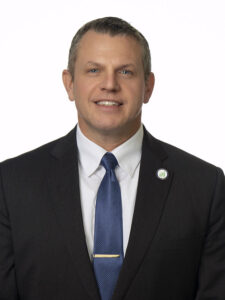
Jason E. Glass
Emerging from the pandemic, we’ve all heard increasing concerns about the current state of the teaching profession, both here in Kentucky and nationally. As districts struggle with filling positions both in the classroom and in support roles, we are seeing some noticeable strains in the educator workforce.
While there have always been shortages in areas such as math, science, special education and highly specialized teaching roles, we are now seeing staffing issues arise in areas such as elementary education and social studies – which historically have had an abundance of applicants. These challenges are particularly tough in rural areas, which accounts for the vast majority of Kentucky’s 171 school districts.
Concerns about the number of people entering the educator workforce are not new. For nearly a decade, we have been seeing a decline in the number of people entering teacher education programs in colleges and universities here in Kentucky and across the nation. While there have been some notable successes – for example, the University of Kentucky has recently experienced an increase in both the number and diversity of people entering their teacher preparation program – the overall effect has been fewer new teacher candidates when jobs are posted.
And now, both during and post pandemic, we are seeing challenges with those already in the teaching profession. Teachers are reporting increased stress and concern for their colleagues, along with reduced job satisfaction. We also are seeing an increase in the number of teachers leaving their posts, resulting in more and more teaching jobs being posted.
So, what has been the effect of these long-time challenges when it comes to the teaching profession?
Districts are having to be less choosy when it comes to selecting teacher candidates. Some superintendents have told me they feel fortunate to get one applicant for some positions. Districts also are increasingly relying on emergency certifications to fill open positions. While this can provide a short-term solution, the effect is that we are hiring more people into teaching roles who are less prepared and qualified than we have in the past.
The reasons for this are complex and long-standing. One issue relates to the total compensation level for educators. After years of erosion of the pay and benefit levels of educators, coupled with an intentional weaking of retirement system incentives to remain in the profession, we should not be surprised that the teacher labor market is presenting us with a shortage. This is a basic and predictable economic result.
A second issue relates to the complexity and demands of the job. As Kentucky has failed to provide funding increases to schools that keep up with inflation, districts must respond by eliminating positions and supports. Yet, the need for these roles remain and they fall upon those left working in the building. When schools are de-staffed over a period of years, class-sizes increase and the workload on remaining educators and staff becomes all the more demanding.
And a third reason we are facing teacher shortages relates to the politicization of education over the past few years. As debates over what to do when it comes to COVID-era policies became increasingly partisan, educators were often caught in the middle of intensely personal attacks where there were no solutions that would appease everyone.
As distressing as all of this may be, the origins of the problems also are the potential sources for solutions. At least in my estimation, it all comes down to three main things: pay, support and respect. If we work on increasing pay, support and respect for our educators, we could begin turning the tide on this daunting issue.
The emerging importance of teacher shortages as a political issue is important, as it is one area where there is strong and bipartisan concern. Having an abundance of high-quality applicants for teaching positions and a well-supported and professional teaching corps are priorities that cross the political divide. It does not matter if one is a Republican or Democrat or something else, everyone wants quality professionals working in their community’s schools.
I have been encouraged by the Kentucky General Assembly taking up this issue over the past several months with a solution-oriented focus. The Interim Joint Committee on Education heard a briefing in June 2022 from the Kentucky Department of Education to get a deeper understanding of the issue. I am also very encouraged and supportive of new House Education Chair Rep. James Tipton, who is looking at legislation to provide some support in this short session and longer-term solutions going forward.
I believe we also have to be clear-eyed about the magnitude of the challenge we face. We didn’t get into this problem overnight and solving it is going to require a focused and multi-year effort if we want to see real results. We have to be wary of quick fixes and small scale solutions, which look good on paper but will not create the magnitude of impact we need to make a dent in this enormous challenge.
There are good reasons to be concerned at the state of the teaching profession, but we also should take heed of that maxim often attributed to Winston Churchill, “Never let a good crisis go to waste.” Now is the time for Kentucky to take meaningful steps toward supporting the teaching profession and commit to the long-haul effort it will take for us to restore teaching to the desirable role that we all need it to be.




Leave A Comment